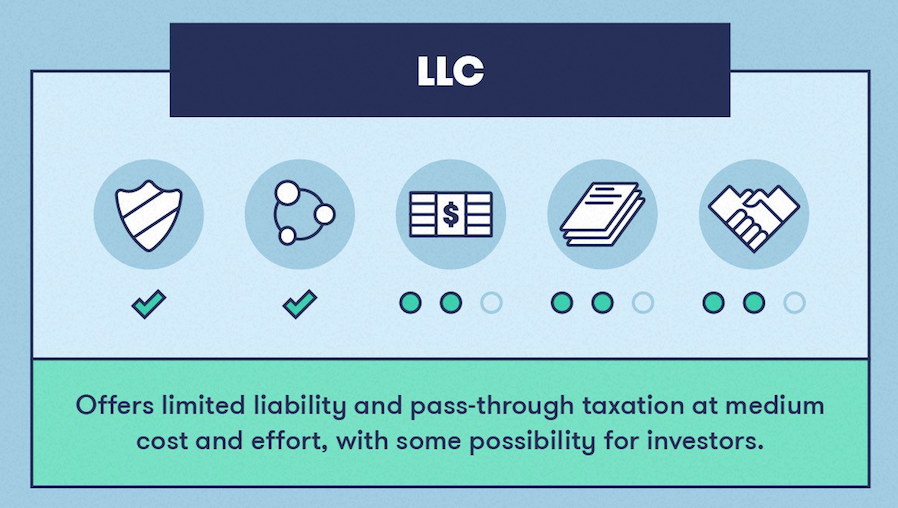A factor that frequently separates a serious entrepreneur from a freelancer is how seriously they take the identity of their business. The consideration of branding, marketing, and consistent communication can set an amateur apart from a business leader. If you’re a successful small business owner, you’ve likely thought about organizing your company’s legal structure to establish its legitimacy. There are several different types of entities that you may find useful for your business’s needs, and you should carefully consider the benefits and drawbacks to each before you commit to a particular structure.
Many small business owners discover that an LLC, or limited liability company, is an ideal legal entity because it combines some of the most useful attributes of both corporations and partnerships. The LLC is a great option if you want to form an entity that can protect its’ owners from debts of the business and offers the option of pass-through taxation. Here are a few of the benefits of forming an LLC:
Reduced Liability
If you’re currently the sole proprietor of your small business or operate in a partnership, it’s likely that the business’s expenses, debts, and funds are essentially an extension of your own financial history. While this is an easy way to start a business, this leaves owners at risk if the business were to lose money, go bankrupt, or become subject to a lawsuit. With an LLC, the business becomes its own entity, allowing your personal assets and bank accounts a measure of separation and protection from debts of the business.
Pass-Through Taxation
As the owner of an LLC, you would have a couple of options for how you want to be taxed. Corporations are subject to something called double-taxation. This means the business is first taxed on its earnings, the remainder is paid out to its owners, who then must pay taxes on those earnings. This effectively means that the company’s profits are being taxed twice. An LLC allows a business’s earnings to “pass through” to the owners before taxation. While personal income tax rates are higher than business income taxes, this can still work out in your favor depending on the deductions you are eligible to claim. In addition, you don’t have to utilize pass-through taxation if you don’t feel it would benefit you. You may also choose to be taxed similarly to a corporation.
Complexity
Another reason many small business owners gravitate towards LLCs is that the paperwork and filing are generally less extensive than with either S corps or C corps. They require less record-keeping and don’t need to hold yearly shareholder meetings, making them ideal for businesses with even just a couple of employees. While they do still require more paperwork and filing than a sole proprietorship or partnership, you may find that the benefits of forming an LLC are worth the slight increase in complexity.
However, the LLC is not the ideal business structure for everyone. You will have to consider the advantages of forming an LLC against the drawbacks:
Investors
LLCs are less attractive to potential investors than corporations. This is because an LLC’s ownership and tax functions disadvantage investors. Unlike with corporations, investors are often required to pay taxes on their share of the business, even if they make no money in that year, and it can be extremely difficult for an investor to sell their shares in an LLC.
Additionally, an LLC cannot go public and trade shares on the open market. It is for these reasons that you should avoid forming an LLC if you still need a significant amount of funding, or plan to go public someday.
Taxes
While you are able to avoid double-taxation with an LLC, there are downsides to this tax structure worth mentioning. As stated, self-employment taxes can be higher than business taxes, so you may not always be saving money with pass-through taxation. In addition to this, LLCs are not exempt from paying property taxes like corporations are, and LLCs organized as a pass-through entity will require the owners to pay taxes that a company usually pays. This means you’ll be directly paying social security and Medicare taxes.
While this doesn’t cover every aspect of forming an LLC, considering these main pros and cons can help you determine if you’re heading in the right direction and if speaking to your lawyer about forming an LLC could be a good idea. An LLC is a great option if you have some extra time for the additional paperwork, want a measure of liability protection, and want to avoid double taxation. The main reason an LLC could be a bad idea is if you still need significant funding or want to sell shares of your company.
If you need help deciding if an LLC is right for you or want to know what other business structure you should use if you are looking for funding, head over to Fundera’s website for a high-level overview of what we’ve covered and other business options out there.
Do I Need an LLC For This?


